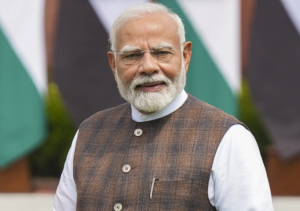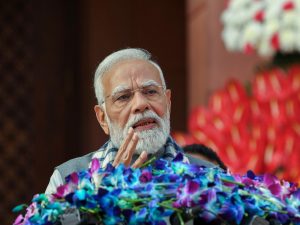India and Germany have expressed their deepest concern over the war raging in Ukraine, including its terrible and tragic humanitarian consequences.
In the Joint Statement, following the 7th India-Germany Inter-Governmental Consultations in New Delhi yesterday, Prime Minister Narendra Modi and German Chancellor Olaf Scholz reiterated the need for a comprehensive, just, and lasting peace in line with international law.
The two leaders also noted the negative impacts of the war in Ukraine with regard to global food and energy security, especially for developing and least-developed countries.
They emphasized that the use or threat of use” of nuclear weapons in the conflict is “unacceptable. They stressed the significance of adhering to international law, as enshrined in the UN Charter.
In the Joint Statement, the two leaders also strongly condemned terrorism and violent extremism in all forms. Prime Minister Modi and Chancellor Scholz also called for unified efforts against all terrorist groups, including those designated by the United Nations Security Council (UNSC).
The leaders expressed their shared interest in achieving peace and stability in the West Asia region. They unequivocally condemned the terrorist attack by Palestinian armed group Hamas on 7th of October last year.
The leaders expressed concern over the large-scale loss of civilian lives and the humanitarian crisis in Gaza. They called for the immediate release of all hostages taken by Hamas and an immediate ceasefire as well as the urgent improvement of access and sustained distribution of humanitarian assistance at scale throughout Gaza.
The leaders underscored the need to prevent the conflict from escalating and spilling over in the region. In this regard, they called on all regional players to act responsibly and with restraint.
India and Germany stressed the importance of the Indo-Pacific for prosperity and security as well as for addressing global challenges. Both sides also highlighted the importance of freedom of navigation and of unimpeded maritime routes in accordance with International Law, in all maritime domains, including in the Indo-Pacific.
In this context, both governments declared their joint intent to conclude a Memorandum of Arrangement regarding mutual logistics support and exchange between the armed forces of India and Germany to further intensify defence and security ties and to establish a basis for provision of mutual logistics support, including in the Indo-Pacific theatre.
With a view to deepening cooperation in the Indo-Pacific, Germany will permanently deploy a Liaison Officer in the Information Fusion Centre – Indian Ocean Region (IFC-IOR) at Gurugram to monitor the marine traffic in IOR.
Both leaders stressed the crucial importance of a comprehensive Free Trade Agreement, Investment Protection Agreement and an Agreement on Geographical Indications between the European Union and India. They called for early conclusion of the negotiations.







